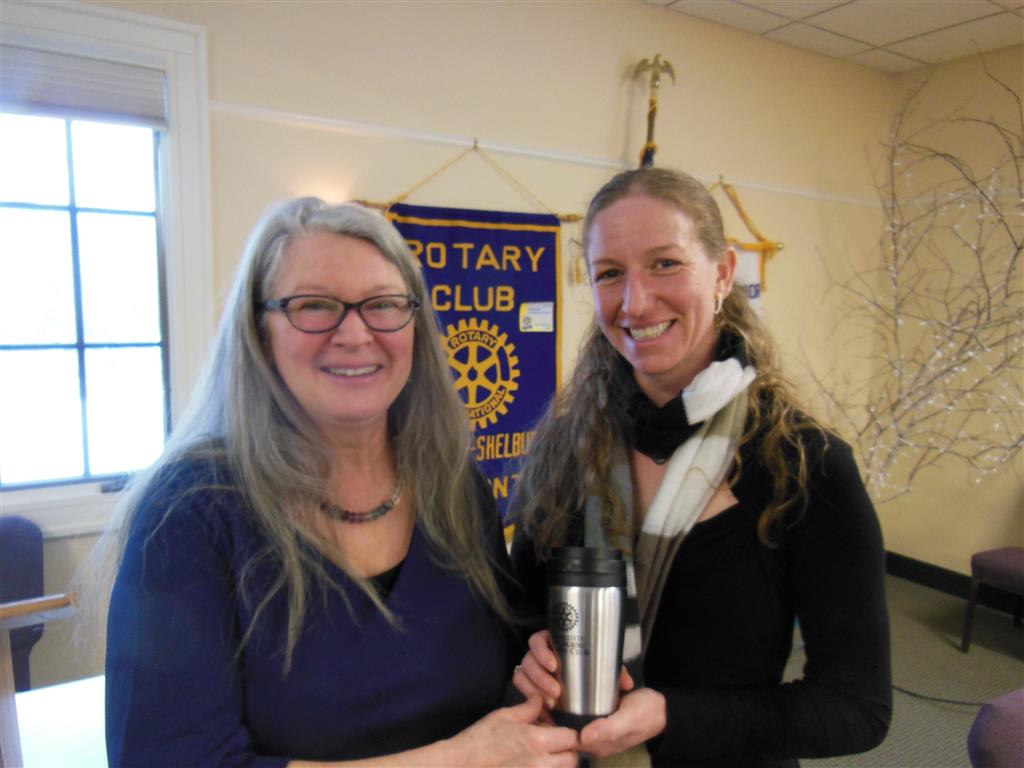Newsletter for Meeting of February 5, 2014
Charlotte Shelburne Rotary
Wednesday, Feb. 5, 2014, 7:30 a.m.
Trinity Episcopal Church Community Room
Past President Kris Engstrom, in the absence of Dave Jonah, opened the meeting with the Pledge and a devotional – including a challenge to play in the snow.
Guests: Kris introduced two unexpected and special guests for a Rotary breakfast – Bob and Ray from Chuck’s Heating and Ventilating. They had arrived at the church to do some heating and ventilating work, but they doors were locked and the secretary hadn’t arrived, so they joined us for breakfast.
Also welcomed guest Theresa Snow, our guest speaker from Salvation Farms.
Kris congratulated the ‘tough’ Rotarians who had braved the snow to be at the meeting, and expressed concern for Bill Root who seemed to be unusually grumpy.
Bowlathon – no kidding. Ric Flood announced that he had just received a check from Burlington Foreign Car Parts for a further $1,800 donation to the 2013 Bowlathon – bringing the total for the fundraiser to $25,800.
Chris Davis issued a warning that even if the ice on the lake looks thick, it does have thin spots and even open water and deserves great caution.
Happy Fines:
Richard Fox levied fines on anyone who had made comments on people seeming grumpy(!) or anyone who saw their shadow on Sunday.
Ric Flood – happy
Robert Maynes – for Bill Deming’s lock fixing skill
Carol Obuchowski – January is over and February is short
Sam Feitelberg – missed going to Honduras as he was recovering from a fall; has celebrated his 84th birthday; the therapist has arrived in Honduras and everyone there is busy
Linda Schiavone – happy birthday to Sam
Lara Keenan -- lovely snow
Michael Clapp -- five weeks – no smokes
Fritz Horton – getting a second opinion on the repair for a mysterious noise in his car saved him $3,000!
Bill Root – a good vacation in Dubai; a late fine; a good class co-taught with Adam Bartsch
Terry Kennaugh – leaving early next week for an RV trip – back in October
Chris Davis – we’re getting snow and Mr. Snow (John Hammer) isn’t here to celebrate it; saw Chuck Dunham recently
Howard Seaver – Friday is the official retirement date – heading for a Costa Rica vacation
Kris Engstrom – apologizing for her Bill Root comments; gratitude to Bill Deming for shoveling the sidewalk; happy birthday to Sam
Evan Webster – for the snow
Lucky draw (for a pot of $363)
Terry Kennaugh’s number was drawn – the pot would have bought at least part of a tank of fuel for the RV – but he didn’t win.
Salvation Farm

Theresa Snow, who grew up in Morrisville, was a Rotary Exchange student while she was in high school, and graduated from Sterling College, is the founder and director of Salvation Farm, a state-wide nonprofit organization on the forefront of an agricultural surplus management movement that is spreading across the state and beyond.
The Salvation Farm strategy is to take surplus or unmarketable farm produce and make it available to institutions, schools, hospitals, and food shelves. Ten years ago Theresa was employed at Pete’s Greens in Craftsbury and started a project there to teach the community about local food. This fostered a big gleaning project that focused on the high quality produce that was being left in Pete’s fields after the harvest, due to a commitment not to take more than one crop from the leafy greens in the fields even though the greens will generate several more crops in a season. In the first ten years of Salvation Farm gleaned 88,000 pounds of produce which was distributed to such clients as senior meal sites, food shelves, and preschools.
Salvation Farm’s motivation is to reduce food waste and reduce the dependence on food sources that are far away, and to engage people in the process of gathering food. The Farm began under the nonprofit umbrella of the Northeast Organic Farmers Association, and then joined the Vermont Food Bank, developing a model for food bank gleaning projects around the state. Since 2011 Salvation Farm has been an independent nonprofit gleaning food and serving hungry people, working to build state-wide partnerships with other organizations and agencies, developing ways to handle the large volume of gleaned produce by finding places and people to process the food for sale, dehydrating apple slices, or making squash puree, for example.
Recorded by Rosalyn Graham